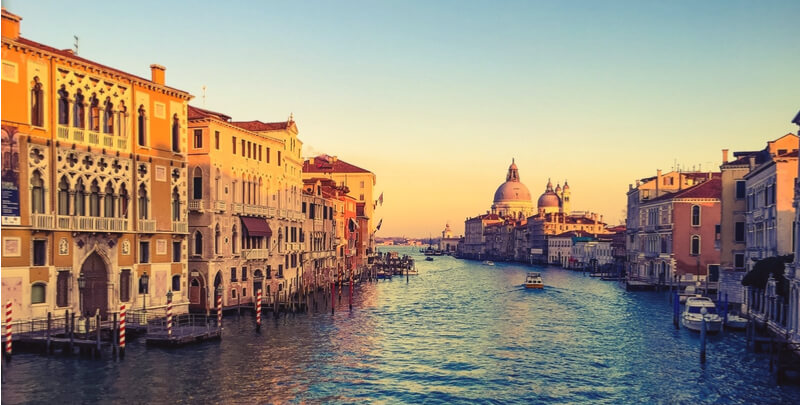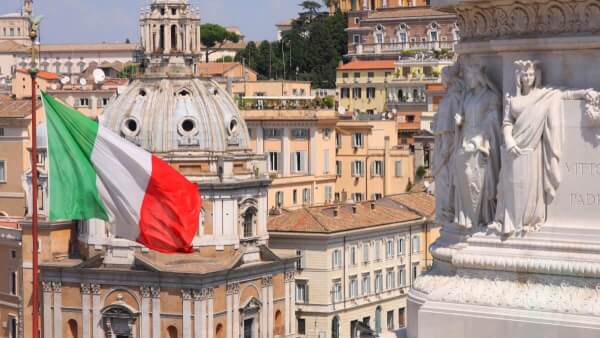Italy Golden Visa program: Full guide
Everything you need to know about getting a Golden Visa in Italy.

Italy is famed for its culture, food and lifestyle, making it no surprise that many foreigners move there to live and work, both in the large cities and off the beaten track. If you’re one of them, then you might be thinking of trading in your residence permit for permanent Italian citizenship. Not only does this cement your place in the Italian family, citizens of Italy also benefit from access to the third most powerful passport in the world. In fact, an Italian passport will give you visa free entry to a full 157 states, from just over 200 countries on the globe.
Whether you’re just starting the application process to get a work visa in Italy or you’re an expat already living there, it’s good to know your options when it comes to switching your visa or permit, for permanent Italian citizenship.
Here’s a quick guide to why you might want to get Italian citizenship - and how you can go about attaining it.
Citizens of Italy have different rights (and responsibilities) to migrants holding permanent residence. As an Italian citizen, you can travel freely in and out of Italy, and never worry about your visa or permit expiring, for example.
Some of the main benefits of citizenship actually come as a result of Italy being a member of the EU. Your Italian passport unlocks many benefits in other EU countries, too, allowing you to live and work freely within the bloc, and access services in other European countries as well as Italy. EU citizens are also given preferential treatment when it comes to seeking employment in Europe, which can be a helpful perk, too.
You can apply for Italian citizenship if you have Italian parents, or in some cases grandparents, if you’re born in Italy, or if you marry an Italian. Otherwise you might be eligible for citizenship through residency if you live in Italy for long enough. The waiting time in this case depends on your circumstance - from four years for people with some Italian heritage, to 10 years, for those coming to Italy from outside of the EU.
Regardless of the route you’re applying to, you have to fulfil certain basic requirements to be eligible, and the Italian government may refuse to offer citizenship if they believe there's any security risk in doing so.
Application processes for Italian citizenship are set out by the Ministry for Foreign Affairs, and their website is a great place to look for process details, and application forms.
It’s possible to be a citizen of Italy, as well as of another country, known as dual citizenship. There are some countries, however, which don’t allow this. Although Italian law won't make you renounce your former citizenship, the country of your first citizenship might not allow you to hold the citizenship of two countries.
If you’re considering seeking dual nationality, it’s worth talking to an immigration specialist or your local embassy to check the rules.
Depending on your personal circumstances there are several different ways you can claim Italian citizenship. If the routes outlined below does not suit your circumstance then you might be able to claim citizenship based on your residency. In this case, you must have lived in Italy for four years if you’re an EU citizen, or 10 years if you’re from the USA or elsewhere outside of Europe.
There are some exceptions to this rule - for example, you might have less time to wait if you have some Italian heritage, and there’s an expedited rule for stateless people from outside of the EU, too.
There’s no specific route to citizenship through investment. Although being an entrepreneur or investor might help you get your visa in the first place, you’ll still have to live in Italy for long enough to meet the residency requirements before your application will be considered.
You can become an Italian citizen through descent if at least one of your parents was an Italian citizen when you were born. Alternatively, if a grandparent was Italian and worked in some form of public service, such as the military or government, you may be able to claim citizenship by descent. Finally, you might be able to claim Italian citizenship if you’re born in Italy to foreign parents but lived there until the age of 18.;
You still have to meet the requirement to be of good character, and you’ll need to prove your identity and the citizenship of your Italian parent or grandparent, if you’re relying on this to claim citizenship.
If you’re married to an Italian and live in Italy, you can claim Italian citizenship through marriage two years after your wedding. If you live outside of Italy, the wait time is three years, although the relevant waiting period is reduced by 50% if you have children with your spouse.
The basic route for applying for citizenship is the same, whatever the grounds for your application. You’ll need to check the exact documents needed for your circumstance, which will be available on the prefecture website. Typically the list is pretty long, so be prepared. Usually documents must be translated and certified if they’re not in Italian, or aren’t original copies.
Applications are then made directly to the prefecture, addressed to the President of the Republic.
Fees are payable for all routes to citizenship - if you’re applying as an adult for Italian citizenship, then you’ll have a bill of EUR 300 to pay.
If you’re applying from abroad and need to make an international money transfer, your bank might charge overcharge you by using a poor exchange rate and adding in administration fees. A better option, if you open an Italian bank account, or know someone who has one already, is to use Transferwise, and have your transfer processed using the real exchange rate with only a small transparent fee.
The processing time for your citizenship application depends on your personal circumstances. Official wait times aren’t published, but it’s reported to take anything from a few weeks to a year to complete all the processes required - so be patient. Your local prefecture will be able to give you a clearer indication when you submit your application.
Once your citizenship is arranged, you can apply for an Italian passport.
As getting a passport is a separate process from getting your citizenship, there are further fees to pay. If you’re not already familiar with money and banks in Italy, you’ll want to do a bit of research, as there will be two separate fees, which amount to EUR 116 for a regular adult passport.
If you haven’t already done so, now’s the time to open a bank account to help cut down on costs.
Getting Italian citizenship and your own Italian passport does involve a bit of bureaucracy, but the process is clearly set out and fairly easy to follow. If you’re just starting out on the journey to becoming an Italian citizen, then you should find the process easy enough to navigate, as long as you can lay your hands on all the documentation required.
Good luck on becoming an Italian citizen!
*Please see terms of use and product availability for your region or visit Wise fees and pricing for the most up to date pricing and fee information.
This publication is provided for general information purposes and does not constitute legal, tax or other professional advice from Wise Payments Limited or its subsidiaries and its affiliates, and it is not intended as a substitute for obtaining advice from a financial advisor or any other professional.
We make no representations, warranties or guarantees, whether expressed or implied, that the content in the publication is accurate, complete or up to date.

Everything you need to know about getting a Golden Visa in Italy.

Thinking about moving to Italy? Find out what you need to know about renting in Italy in this guide.

Get ready for la dolce vita with our guide on retiring in Italy.

Looking for jobs in Italy? Find all you need to know about Italian work visa requirements.

Here’s the lowdown on who can apply and how you go about getting dual citizenship with Italy.

Getting married in Italy is relatively straightforward. Like any wedding though, it requires advanced planning, as well as a basic understanding of the law....